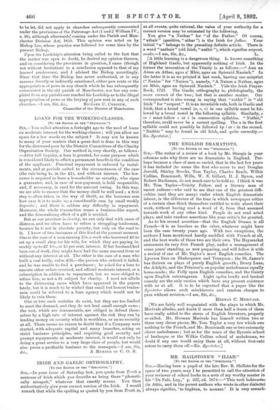LOANS FOR, THE WORKING-CLASSES.
[To TIM EDITOR OF THE " SPECTATOR:1
SIR,—You called attention a fortnight ago to the need of loans on moderate interest for the working-classes ; will you allow me space for a few words on the subject P It may not be known to many of your readers that a great deal is done in this way for the distressed poor by the District Committees of the Charity Organisation Society. Our method is, very shortly, as follows : —After full inquiry, a loan is granted, for some purpose which is considered likely to effect a permanent benefit in the condition of the applicant. Punctual repayment is enforced by instal- ments, and at periods suited to the circumstances of the case (the rule being is. in the £1), and without interest. The bor- rower is required to have a householder as security, who signs a guarantee, and, in case of non-payment, is held responsible, and, if necessary, is sued for the amount owing. In this way, we are able to ensure that the money shall be well used ; a first step is often taken in the way of thrift, as the borrower sees how easy it is to make up a considerable sum by small weekly deposits ; and there is seldom any difficulty in repayment. Moreover, the whole transaction wears a business-like aspect, and the demoralising effect of a gift is avoided.
But as our province is cleirity, we can only deal with cases of distress, and we often have to refuse a struggling tradesman, because he is not in absolute poverty, but only on the road to it. I know of two instances of this kind at the present moment. One is the case of a man earning 25s. a week who borrowed £6 to set up a small shop for his wife, for which they are paying 5s. weekly up to £7 103., or 25 per cent. interest. If her husband had been out of work, they might have had the same amount from us without any interest at all The other is the case of a man who built a coal trolly, value £38,—the person who ordered it failed, and he was unable to find a purchaser ; he asked for a loan to execute other orders received, and offered moderate interest, or a subscription in addition to repayment, but we were obliged to refuse him, as not a fit subject for charity. I need not allude to the distressing cases which have appeared in the papers lately, but it is much to be wished that small but honest trades- men could be referred to a loan agency which would not be likely to ruin them. One or two such societies do exist, but they are too limited to meet the demand, and they do not lend small enough sums ; the rest, which are innumerable, are obliged to defend them- selves by a high rate of interest against the risk they run by lending money on security which is worthless, or on no security at all. There seems no reason to doubt that if a Company were started, with adequate capital and many branches, acting on strict business principles, and requiring good security and prompt repayments at moderate interest, it would not only be doing a great service to a very large class of people, but would also prove a profitable business to the managers.—I am, Sir,
A MEMBER OF C. 0. S.


































 Previous page
Previous page